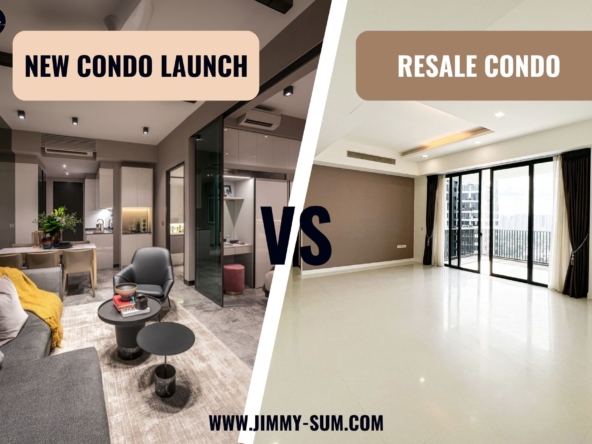In a land scarce Singapore, space is often considered a luxury. Spacious properties that can house up to three generations are becoming rare. For starters, the first thing that an investor or buyer caters too, is the size of the property. A larger residential property will allow the homeowner to attend through all stages of life without the hassle of constant movement. On the other hand, the owner of a small unit is likely to relocate several times to accommodate his changing family requirements.
While the case for a larger unit can be made quite easily, the argument is less distinct when it comes to freehold or leasehold properties. The age-old debate of whether to buy a freehold or a leasehold property has bemused the real estate industry over time. Every buyer has pondered over this dilemma before investing into a property.
Ask any homebuyer and it is likely that most of them will prefer a freehold property over a leasehold one, since they believe a freehold tenure will allow them to own that property forever. However, there are various factors that must be taken into consideration before jumping to a conclusion.
In this article, we will elaborate the distinctions between freehold and leasehold property in Singapore to help you in your judgment.
The Fundamentals
As the name suggests, the primary difference between a freehold and a leasehold property lies in the fact that, the freehold property doesn’t have a time limit attached to its title, while the other one does.
Freehold Property
As per the Land Acquisition Act, 1960, the state may and can take back freehold properties, albeit, for economic development and LRT (light rail transit) projects. In such cases, the homeowners have little choice other than selling their property to the government. Otherwise, that land is deemed to have been disposed of and set aside by the state to an individual or a company for an indefinite amount of time. Compulsory acquisition by the government can affect both freehold and leasehold properties.
Leasehold property
On the contrary, leasehold properties are the ones being built on land that has been typically leased from the state (99 years). However, there are certain properties, (a holdover from the colonial era) comprising of a lease period of 999 years. They are considered similar to freehold, for all intents and purposes. When the lease finally expires, the property owners will have to apply again for an extension, which the state will only approve at its discretion.
The state usually approves such extensions if there isn’t any compelling reason against it. However, the process can be long and tedious and can cost a significant amount, as nobody knows what’s going to happen 50 or 70 years down the line.
Restrictions
Some leasehold properties may consist of restrictions regarding their usage. This might pose a bigger problem towards owners of the land or the property looking to convert it for another use. On ignorance or violation of such restrictions, the state can forfeit the lease and confiscate the property subsequently.
Which Is Worth More?
It is quite difficult to isolate individual causes regarding property value, as a lot of factors enter the picture. For example, a property located at the center of the city or a business hub, but with a lease period of 70 years, will probably be worth more than a freehold one located on the outskirts. If a freehold property is located near to an LRT station, it can be hard to determine its valuation. The fact that its freehold and the accessibility act in its favor. Although, down the line, it may get affected if the project is expanded.
As per the rule of thumb, the initial sale price of a freehold property tends to be 10-15% higher than a leasehold property situated in the same area. The uncertainty and lease limitations surrounding leasehold properties work in their favor, making them cheaper. However, new leasehold properties nowadays tend to have a similar price structure as their freehold counterparts. They provide extra facilities and public amenities as a neutralizing effect.
Long Term Effects
Long term effects on leasehold properties and their appreciation rates can become severe once they near the end of their lease tenure. During the first three decades, the property prices generally remain similar to the freehold ones and may even appreciate along with market rates. However, as the property nears its end of lease term, its price starts to depreciate and stagnate significantly until the expiry of such term.
Time Taken
As it requires the approval of the state before changing of hands, buying or selling a leasehold property down the road can take up a significant amount of time when compared with a freehold one. Leasehold properties tend to fare better when used for rental purposes. They are cheaper, the time taken to change hands is significantly less, and the tenants are not generally affected by the fact whether it’s freehold or leasehold. They are more concerned about location and amenities on offer. It also means less capital outlay for the owner along with a steady inflow of cash.
Financing
As the time period of lease starts running down, it can become increasingly difficult for new buyers of leasehold properties to obtain sufficient loans from the banks. Banking institutes generally prefer to finance the purchase of properties that have at least 75 years left on their lease period. This is because in case the owner fails to repay the loan, the banks would require the property as collateral. However, if the property has less than 50 years left on its lease, its value would have depreciated significantly, which would definitely lead to a loss.
Which One to Choose
Though older freehold properties are most likely to be put up for sale, they tend to fetch a much better price when compared to their leasehold peers. Additionally, developers purchasing such freehold properties are not required to pay a development premium to the government. Although, leasehold developments require to pay a premium amount as a top-up to increase the tenure length back to 99-years.
However, if you are planning to buy a property for your personal consumption, and don’t intend to use it for more than two generations at the most, buying a leasehold property at a suitable price might be a good bargain.
Given a choice, all factors would indicate towards purchasing a property with a freehold title, which not only offers more amenities but also fewer complexities.




